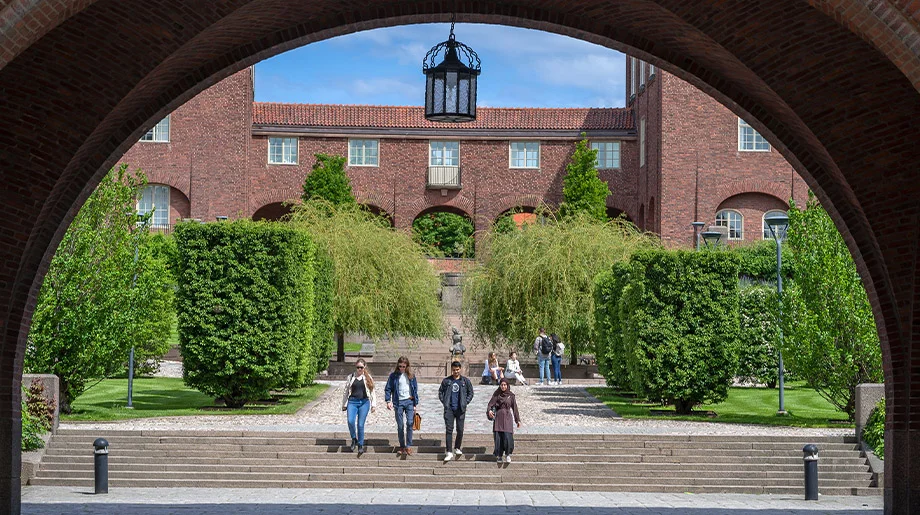MSc Innovative Technology for Healthy Living
The master's programme in Innovative Technology for Healthy Living focuses on technical solutions for wellness and active lifestyles. Big data obtained by sensors and wearables from regular citizens and professional athletes is translated into contributions to healthy living, boosting public health initiatives and wellness innovations. Graduates are R&D specialists with vital entrepreneurial skills who can bridge human science, technology, and health.

Innovative Technology for Healthy Living at KTH
The master's programme in Innovative Technology for Healthy Living is a collaboration between academia, research centres and industry. The programme fosters a new generation of master's graduates with advanced skills and innovative approaches to health-related engineering. The programme equips you with the skills to develop technical and business solutions for healthy living and active ageing. Your work will encourage good health habits in the general population and promote the future wellness of all citizens. The programme aims to enable future scientists and entrepreneurs to create engineering and business solutions that help citizens monitor and manage their health by equipping them with the knowledge and skills to make wellness-driven choices.
The programme is supported by a highly experienced academic faculty with expertise in designing and implementing sports and exercise activities for individuals of all fitness levels. Using evidence-based data ranging from anthropometric and biomechanical to physiological and psychological parameters, they assess the impact of these activities on health and well-being. Students will gain hands-on experience with cutting-edge technologies such as wearable sensors, multimodal medical imaging, biomechanics, and Big Data analytics, enabling them to develop personalised and scalable health solutions.
The curriculum blends theoretical knowledge with practical application. Students engage in active learning, team-based projects, and real-world challenges that foster innovation and entrepreneurship. Courses are designed to build skills in ideation, project management, and business development, often through workshops and collaborative round tables. A key focus is on creating personalised lifestyle plans and wellness-driven solutions that address the needs of an ageing population.
On successful completion of the programme, the graduates should be able to:
- Conduct independent research demonstrating a high level of discipline-specific skills.
- Illustrate a deeper understanding of practical translational research through laboratory practice or industrial rotations.
- Acquire skills relating to value-based healthcare to quantify the effect of the different interventions.
- Describe the translation of innovative research into the clinical and commercial arena in detail.
- Demonstrate awareness of the development and protection of Intellectual Property.
International mobility during the programme
Students are encouraged to spend their third semester at another university to gain other I&E experience and take courses unavailable at KTH. For example, you might intern at other universities' premises or through clinical, SME or industrial placements.
This is a two-year programme (120 ECTS credits) held in English. Graduates are awarded the degree of Master of Science. The programme is held at the KTH School of Engineering Sciences in Chemistry, Biotechnology and Health, with activities mainly held at the KTH campus in Flemingsberg, Stockholm.
Courses in the programme
The courses in the programme cover topics such as Health management, innovation and entrepreneurship, wellness, biomedical imaging and visualisation, biomechanics, sensor technology, big data analysis, personalised medicine, artificial intelligence and healthcare logistics.
Courses in the programme Innovative Technology for Healthy Living
Future and career
The master's programme in Innovative Technology for Healthy Living is a collaboration between partners from academia, research centres and industry to create a new generation of students with multidisciplinary research skills capable of translating research outcomes into innovation and entrepreneurship initiatives and business opportunities. Graduates lead the creation of new devices, services and professions for a healthier Europe. After graduation, you can expect to assume roles such as innovator and entrepreneur within the medical technology, healthcare, and wellness sector; project manager; healthcare and medical technology consultant; and data analyst specialising in healthcare and wellness advisory.
Considering that the final master's degree project is industry and clinically motivated, a logical next step is to investigate its commercial and business potential. Graduates from the programme are qualified to join innovation projects at KI/KTH (for example, We@Work and POSITIVE) and leading industrial companies (for example, Philips, Maquet Critical Care and ContextVision) and have the potential to contribute to regulatory institutions and governing bodies.
Graduates may also be eligible to continue studies at the doctoral level at KTH or another university worldwide. KTH has a joint PhD programme with Karolinska Institutet (KI), one of the world's foremost medical universities, also located in Stockholm.
Faculty and research
The research at the KTH School of Engineering Sciences in Chemistry, Biotechnology and Health covers many current and future emerging biomedical engineering topics such as image processing and visualisation, medical engineering, biomechanics, mechatronics, rehabilitation technology, precision medicine, Lab-on-Chip and Organ-on-Chip, artificial intelligence and healthcare logistics.
Research related to the programme is performed at the department Department of Biomedical Engineering and Health Systems , particularly in the divisions of Biomedical Imaging and Neuronic Engineering and, to an extent, the division of Health Informatics and Logistics.



